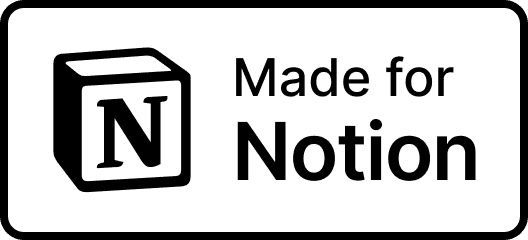The Roadmap to Product Success: Crafting and Managing Roadmaps with Notion


The Roadmap to Product Success: Crafting and Managing Roadmaps with Notion
In the dynamic landscape of product development, a well-defined roadmap serves as your guiding compass. It aligns your team with a shared vision, ensuring clarity around priorities, timelines, and strategic goals. Product roadmap software plays a critical role in crafting, visualizing, and managing these roadmaps, fostering transparency and effective communication across teams.
The Power of Visual Roadmaps
Visual roadmaps provide a clear, concise overview of your product’s journey by highlighting key milestones, features, and dependencies. These visual tools are invaluable for communicating the product vision to stakeholders, allowing them to understand progress and strategic direction at a glance. Roadmaps make complex product development processes accessible and provide a unified framework for tracking and prioritizing initiatives.
Notion as Your Roadmap Command Center
With its flexibility and collaborative features, Notion is an ideal platform for creating and managing product roadmaps. Here’s how Notion can become your roadmap command center:
Timeline Views: Notion’s timeline view allows you to visualize your roadmap chronologically, helping you spot potential overlaps, dependencies, and conflicts.
Kanban Boards: Track the progress of features and initiatives using Kanban boards, providing a clear visual of your workflow and the status of key tasks.
Linked Databases: Use linked databases to connect your roadmap with other essential information, such as user stories, tasks, and feedback. This keeps your roadmap updated and aligned with real-time developments.
Collaboration: Notion’s real-time editing and commenting enable seamless collaboration on your roadmap, ensuring that everyone remains informed and aligned.
Key Benefits of Using Notion for Roadmapping
Flexibility: Customize your roadmap to fit your team’s specific needs and preferences, tailoring it for various products or project stages.
Collaboration: Share your roadmap with stakeholders, enabling transparent communication and fostering a collaborative culture.
Integration: Link your roadmap with other Notion workspaces and external tools for a comprehensive view of the product development process.
Affordability: Notion’s cost-effective pricing makes it a popular choice for startups and SMBs seeking a powerful roadmap solution without the high costs.
Best Practices for Creating and Managing Roadmaps in Notion
Start with the Why: Begin with a clear product vision and strategic goals that your roadmap supports. This sets a strong foundation for decision-making.
Involve Stakeholders: Collaborate with key stakeholders early to gather insights, align expectations, and ensure buy-in from all relevant parties.
Prioritize Ruthlessly: Focus on high-impact initiatives that drive value. Avoid overloading the roadmap to maintain clarity and focus.
Keep it Simple: Use clear language and visuals to make your roadmap easy to interpret, even for non-technical stakeholders.
Regularly Review and Update: Revisit your roadmap regularly to track progress, adjust priorities, and incorporate new insights as they arise.
A well-crafted product roadmap is essential for navigating the complexities of product development and achieving success. Notion’s versatility, collaborative capabilities, and affordability make it a powerful tool for creating and managing roadmaps that empower your team and advance your product vision. By aligning everyone on a shared path, Notion enables you to drive your product forward with purpose and clarity.
If you are looking for specific roadmapping use cases, get our Product Roadmap OS to get started and eventually upgrade to the full package to add discovery capabilities.
